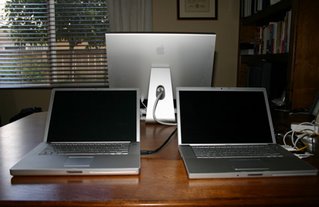
So, what's the real deal with prepaid cell phones?
Although I have a regular cell phone with a post-paid account I bought a prepaid cell phone to check out its pros and cons for myself. If you don't use many hundreds of minutes/month, a prepaid cell phone could definitely be less expensive.
Like all telephone plans, it took some learning (and mistakes) - in the end I feel like I've become somewhat of a reluctant expert regarding Cingular's prepaid phone plans.
Basics
I bought the cheapest phone I could find which cost $29.99 (plus tax). This plan included $10 of prepaid minutes (airtime). So, effectively, the phone cost $19.99. It's a basic phone with a simple color LCD, wall charger, and instructions. It also has basic services including SMS (not MMS) text messaging and the ability to lock the handset and SIM card. The phone can be purchased anonymously.
Gotchas
For starters, you have to decide on which plan you want - you have two options. Do you want to pay 10¢/minute? If so, then you'll pay $1/day for each day you use the phone. Don't want to pay the $1/day fee? Just choose the other plan which charges a flat 25¢/minute.
So which plan is for you? Simple, do you plan on using the phone for more than seven minutes per day on the days you'll be using it? If so, then choose the 10¢/min with the $1/day access fee.
Since I only use the phone for text messaging, I chose the 25¢/min plan and I pay 10¢/SMS sent and received. (America is the only country I know that charges you for both sending and receiving text messages. But that's a different story.)
The next gotcha is the expiring minutes strategy. Since there aren't any monthly access fees for the phone company to charge you when you're not using the phone they have set an expiration date on the minutes you purchase.
$10 expires after 30 days.
$25-$75 expires in 90 days.
$100 expires in 365 days.
There's one saving grace: if you purchase additional minutes before your current minutes expire then your entire balance carries over.
Changing Phone Numbers
Here's a pain I'm currently enduring - I just changed the phone number on my prepaid cell phone. The rep in the store told me that it shouldn't cost anything to get the new number and it would be effective immediately. Within minutes my SIM card was updated, over-the-air, with the new phone number.
The only problem was that the minutes didn't carry over, so the phone was effectively useless - I could neither make nor receive any phone calls - until I added more minutes. The store rep told me that it might take a few minutes, up to an hour, (or maybe 24 hours). I returned an hour later and, since it was Christmas Eve, he added $10 to the phone to get me through the rest of the day. Two days later and the minutes haven't carried over - the store reps working today told me that it might take up to five business days. Stay tuned.
Updated 1/6/07 : I finally got the funds transferred to the new number. Dialing Customer Care was a waste - after three calls, over the course of a week, I gave up on them. A manager at the retail store was the way to go. He just gave me a prepaid card of equal value and we called it a day.






